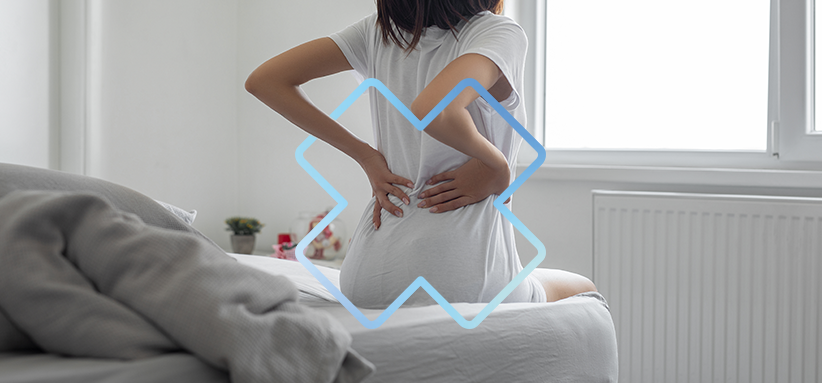A herniated disc affects the discs located between the vertebrae of the spine. It can cause back pain or leg pain, but sometimes remains symptom-free. When properly managed, it can be effectively treated without surgery. Learn to recognize the signs and relieve your symptoms.

What is a Herniated Disc?
A herniated disc occurs when an intervertebral disc is injured, which can lead to a tear in the fibrous ring that holds the nucleus in place. In some cases, this can irritate a nearby nerve root, causing pain and numbness in the leg. A herniation can occur at different levels of the spine, but it is most common in the lumbar region (lower back).
Different degrees of severity:
There are different degrees of severity of herniation, ranging from disc bulging to sequestration, in which the nucleus separates from the disc. The latter, much rarer case may require surgery. The other, more common grades can be treated through rehabilitation.
Common symptoms:
- Localized pain in the lower back or in one leg
- Numbness, tingling, or burning sensation
- Pain worsened when sitting, bending forward, or coughing
- Weakness in the leg or foot (in some cases)
YOU
KNOW?Many people live with disc bulges or herniations without any symptoms.
What can cause a herniated disc?
A herniated disc is not always related to an accident. It often results from the accumulation of microtraumas over time, such as:
- Repeated lifting of heavy loads with poor technique
- Frequent twisting movements
- Muscle weakness or imbalance
Cervical herniated discs
Did you know? Herniated discs can also occur in the cervical region (the neck). Common symptoms include pain located in the neck, shoulder blade, and/or arm. Numbness and tingling may also be present. Just like lumbar herniated discs, cervical herniations are not necessarily painful. When pain does occur, physiotherapy treatments can help reduce symptoms in most cases.
How to relieve pain related to a herniated disc?
Expert tip : Stay active !
Maintaining adapted physical activity speeds up recovery. Avoid prolonged rest. A gradual return to regular activities promotes lasting recovery.
Which professional should you see?
Start by consulting a physiotherapist. They will assess your needs and, if necessary, recommend other professionals to optimize your rehabilitation.
Frequently asked questions (FAQ)
Can a herniated disc heal without surgery?
Yes. In most cases, symptoms subside with conservative treatments such as physiotherapy.
Learn more about physiotherapy
Can I exercise with a herniated disc?
Yes, under supervision. Adapted exercises help strengthen the back without worsening the pain.
Does the pain go away completely?
Often, yes. But it is essential to maintain good habits (posture, mobility, strengthening) to prevent recurrences.
What are the first symptoms?
Typically, back pain or pain in the buttock area appears first. Depending on the case, leg symptoms (pain or numbness) may occur at the same time. In some instances, people may even experience leg pain without having back pain.
Should I walk with a herniated disc?
It depends on each person’s condition. One essential thing: remaining completely inactive and bedridden is never recommended. Alternating positions and performing gentle movements as tolerated is advised.
What is the difference between sciatica and a herniated disc?
Sciatica refers to pain, whereas a herniated disc is a physical condition. Sciatica, also called sciatic nerve pain, is often a symptom related to a herniated disc, although it can have other causes.
Have questions? Call us at 1 855 743-9872 or write to us at informationsweb@physioextra.ca. Our team will guide you to the right professional.


